We fact-checked a Geo fact-check and found Imran Khan got it right
6 min readFormer prime minister and PTI Chairman Imran Khan shared on Wednesday a quote from the founder of Pakistan, Mohammad Ali Jinnah when he congratulated the new military commanders, Chairman Joint Chiefs Gen Sahir Shamshad Mirza and Chief of Army Staff Gen Syed Asim Munir. Soon after Khan fired his tweet, the fact-checkers at Geo TV claimed that the PTI chief had made a mistake and put the wrong date on Jinnah’s statement.
Imran Khan, who lost power in April this year after championing closer civil-military interaction for three and a half years, quoted Jinnah as saying “Do not forget that the armed forces are the servants of the people, and you do not make make national policy; it is we, the civilians, who decide these issues, and it is your duty to carry out these tasks with which you are entrusted.”
Khan — or most likely his team — then added in parenthesis “(Quaid-e-Azam to Armed Forces; Aug 14, 1947)”. This is the day the country was founded.
The fact-checkers at Geo TV rushed to claim that Jinnah addressed Pakistan military officers at the Staff College Quetta on June 14, 1948, and not on August 14, 1947. While it is true that the Staff College Quetta address was delivered on June 14, 1948, Jinnah did speak to a group of military officers a day before he was sworn in as the first Governor General of Pakistan.
But he did not use those words – quoted by Imran Khan and others –– when he addressed army officers in Quetta exactly 10 months later. We will tell you what he said in a moment. Some context first.
This is not the first time Jinnah’s statement on civil supremacy has been used by a politician in the country. Pakistan Muslim League Nawaz (PMLN) used it twice and garnered controversy at least once.
In 2008, PMLN issued an advertisement that used two of Jinnah’s quotes. The first was the same as used by Imran Khan and the second was from Jinnah’s address to the All India Muslim League held in Delhi on April 24, 1943. But PMLN claimed that Jinnah made the statement at Staff College Quetta.
Back then, it was Daily Times that fact-checked the PMLN claims.
The party soon ditched its civil supremacy narrative and its leader Nawaz Sharif bought into what the military said when the infamous Memogate happened.
The second time PMLN used the same quote was in October 2020 when Nawaz Sharif was in exile after losing power and spending over a year in jail.
Nawaz Sharif tweeted the quote with a picture from the October 12, 1999 coup.
Ironically, only a year before he wrote the tweet, his party had supported Imran Khan’s decision to grant an extension to then-COAS General Qamar Javed Bajwa.
What did Quaid-i-Azam say
Jinnah’s statement about civil supremacy was a warning to Colonel (later Major General) Akbar Khan. The strongest first-hand account we have today is from Air Marshal (retired) Asghar Khan— strongest because he was one of the military officers meeting Jinnah.
In his book We’ve Learnt Nothing from History (OUP, 2005) Asghar Khan narrates his and Akbar Khan’s encounter with Jinnah.
“The second time when I had the opportunity to meet Mr Jinnah and to hear his views on an important subject was on 14 August 1947 in Karachi. As the Governor-General of Pakistan, he had given a large reception on the lawns of the Governor-General’s House, now the Governor’s House, in Karachi. I was among the dozen or so officers of the armed forces invited and one of the others was Lt. Colonel (later Major-General) Akbar Khan of ‘Rawalpindi Conspiracy’ fame. Akbar Khan suggested that we should talk with the Quaid-i-Azam. The Quaid was moving around meeting his guests and when he came near us he asked us how we were. Akbar Khan replied that we were very happy that he had succeeded in creating a free and independent country and we had hoped that under his leadership ‘our genius will be allowed to flower’. He went on to say that we were, however, disappointed that higher posts in the armed forces had been given to British officers who still controlled our destiny. The Quaid who had been listening patiently raised his finger and said, ‘Never forget that you are the servants of the state. You do not make policy. It is we, the people’s representatives, who decide how the country is to be run. Your job is only to obey the decisions of your civilian masters.’
“Having said this he moved on. The Quaid’s words obviously did not have any effect on Akbar Khan who, a few years later, tried to topple the government of Liaquat Ali Khan in what came to be known as the ‘Rawalpindi Conspiracy’ case. This attempt has been repeated a number of times since and has been successful on at least three occasions since the Quaid had uttered those words in Karachi.”
A slightly different version
You might have already noticed that Imran Khan and Nawaz Sharif both used a version of Jinnah’s quote that reads differently from the one quoted by Asghar Khan.
When we tried to fact-check it, we found that Asghar Khan himself has used this different version elsewhere. Asghar Khan edited and contributed a chapter to the book The Pakistan Experience: State and Religion (Vanguard Books,1985). He used the more popular version of the quote there on page 245.
So the first version reads: “Never forget that you are the servants of the state. You do not make policy. It is we, the people’s representatives, who decide how the country is to be run. Your job is only to obey the decisions of your civilian masters.”
And the second version reads: “Do not forget that you in the armed forces are the servants ofthe people. You do not make nationai•policy. It is we, the civilians, who decide these issues, and it is your duty to carry out the tasks with which you are entrusted.”
What Jinnah wanted of men in uniform
Jinnah’s address at Quetta Staff College on June 14, 1945, was probably harsher than his warning to Colonel Akbar Khan.
This speech is rather curt — merely around 450 words— and Jinnah reads out to troops their oath.
Immediately after opening his speech and thanking the people present, Jinnah broached the topic that was on his mind.
“One thing more, I am persuaded to say this because during my talks with one or two very high-ranking officers I discovered that they did not know the implications of the Oath taken by the troops of Pakistan. Of course, an oath is only a matter of form; what are more important are the true spirit and the heart.”
Only two paragraphs later, he said what barely anyone would adhere to about civilian supremacy.
“I want you to remember and if you have time enough you should study the Government of India Act, as adapted for use in Pakistan, which is our present Constitution, that the executive authority flows from the Head of the Government of Pakistan, who is the governor-general and, therefore, any command or orders that may come to you cannot come without the sanction of the Executive Head. This is the legal position.”
Jinnah also said he “will be glad to meet the officers informally, as suggested by the General Officers Commanding in his speech” and spokes about increasing contacts with defense forces once “things settle down.”
But he passed away within three months and things never settled down.
For the latest news, follow us on Twitter @Aaj_Urdu. We are also on Facebook, Instagram and YouTube.














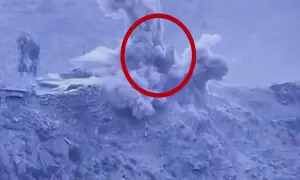
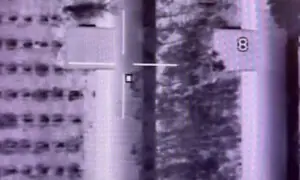
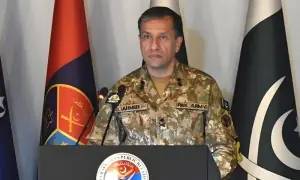
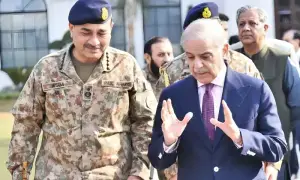
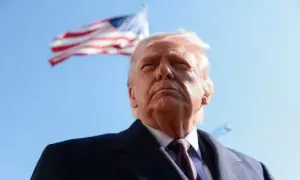
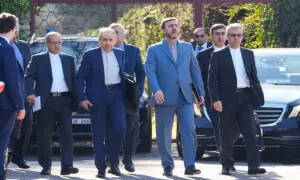


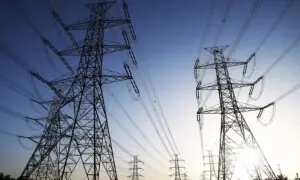



Comments are closed on this story.